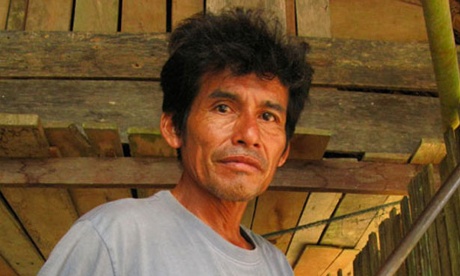
Illegal loggers are being blamed for the murder of four Asheninka natives including a prominent anti-logging campaigner, Edwin Chota, near the Peruvian frontier with Brazil.
Authorities in Peru have confirmed that Chota, the leader of Alto Tamaya-Saweto, a community in Peru’s Amazon Ucayali region, fought for his people’s right to gain titles to their land and expel illegal loggers who raided their forests on the Brazilian border. He featured in reports by National Geographic and the New York Times that detailed how death threats were made against him and members of his community.
“This is a terribly sad outcome. And the saddest part is that it was a foreseen event,” said Julia Urrunaga, Peru director for the Environmental Investigation Agency, an international conservation group.
“It was widely known that Edwin Chota and other leaders from the Alto Tamaya-Saweto community were asking for protection from the Peruvian authorities because they were receiving death treats from the illegal loggers operating in their area.”
Local leader Reyder Sebastian Quinticuari, the president of Aconamac, an association of Ashaninka communities, told local media that Edwin Chota and his companions were killed on 1 September but the news was delayed due to the remoteness of the location.
The circumstances of the deaths are not clear but one local indigenous leader, Robert Guimaraes Vasquez, told a newspaper that illegal loggers bound and shot Chota and companions on the sports field in their village in front of the inhabitants. He said illegal loggers were taking revenge after having been reported to the authorities.
The Associated Press said the other slain men were identified by a police official in Pucallpa, the regional capital, as Jorge Rios, who was Chota’s deputy, Leoncio Quincicima and Francisco Pinedo.
“Edwin Chota’s widow and other villagers travelled for six days by river to come here to report this crime,” Peru’s vice minister of intercultural affairs, Patricia Balbuena, told the Guardian. She had travelled to the regional capital, Pucallpa, to further investigate the case.
“There are no military or police posts in these dangerous border regions and that must change,” she added, indicating police would travel to the scene of the crime as part of the investigation.
Henderson Rengifo, a leader with Peru’s largest indigenous federation, Aidesep, called on the Peruvian state to do more protect indigenous people from criminal mafias.
“There’s so much corruption in the regional governments that these logging mafias can kill our brothers with impunity,” he told the Guardian.
“We must ensure that justice is done and this crime does not go unpunished.”
A 2012 World Bank report estimated that as much as 80% of Peru’s logging exports are harvested illegally [PDF] and investigations have revealed that the wood is typically laundered using doctored papers to make it appear legal and ship it out of the country; while a 2012 report by the Environmental Investigation Agency indicated at least 40% of official cedar exports to the US included illegally logged timber.
A recent operation conducted by Peruvian customs looked at other timber species and, in three months, stopped the export of a volume of illegally logged timber equivalent to more than six Olympic pools.














